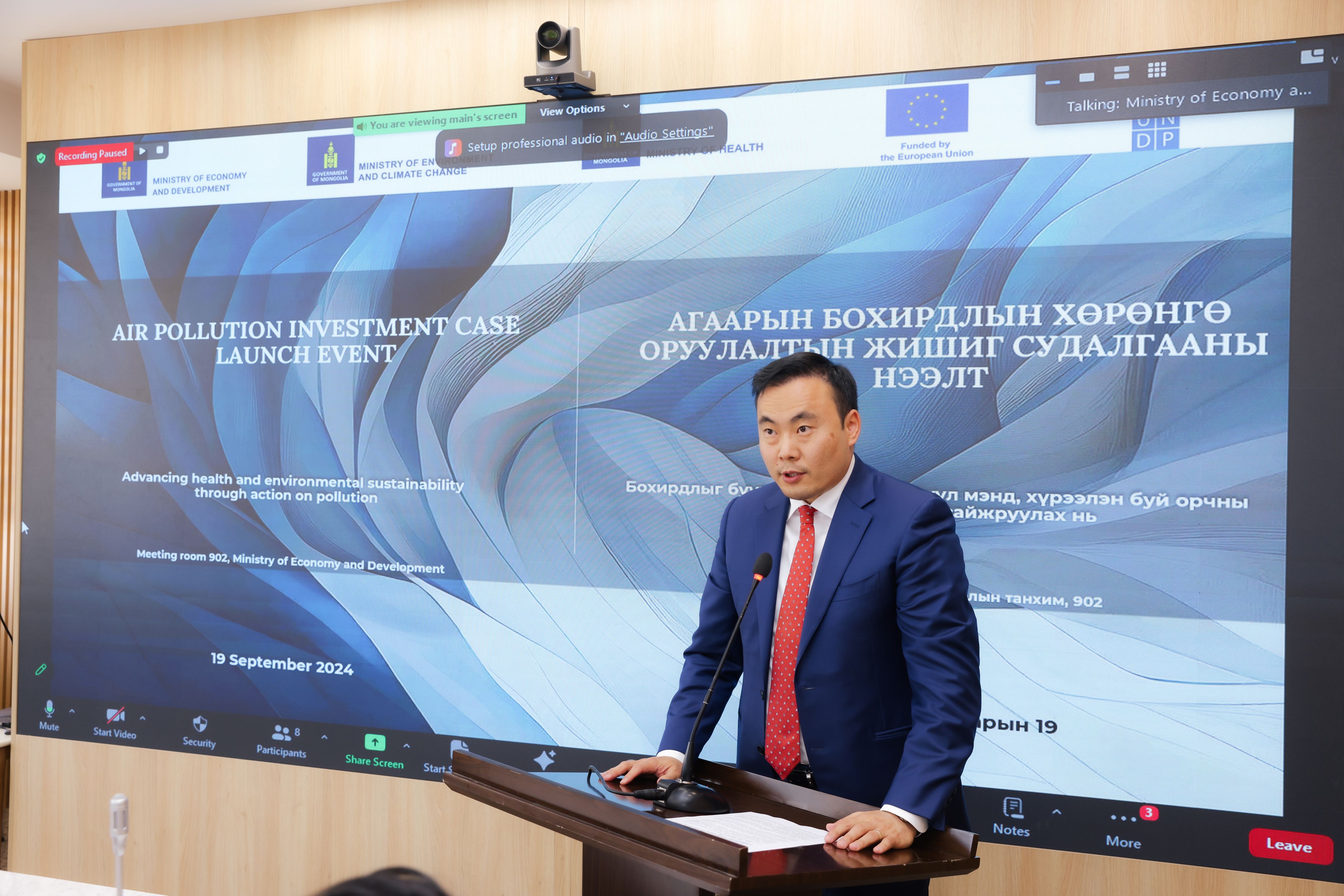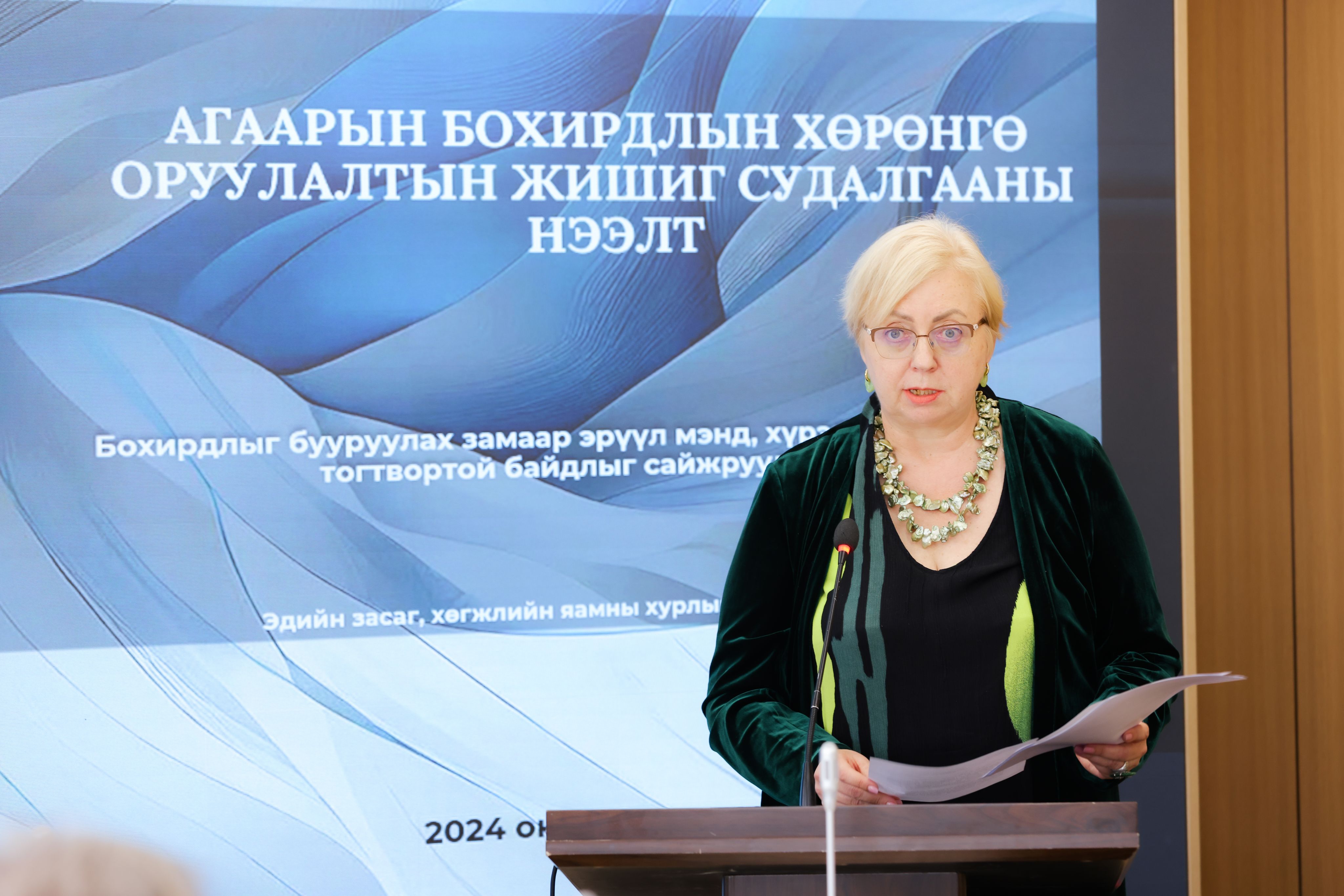European Union and UNDP support air pollution mitigation efforts in Mongolia
September 19, 2024

The launch event for the "Investment Case for Air Pollution in Mongolia"
The launch event for the "Investment Case for Air Pollution in Mongolia" was held to present the study's findings, which analyze air pollution challenges and explore potential mitigation measures. High-level representatives from key government bodies, sector experts, researchers, academia, and NGOs discussed the findings from quantitative analyses of the health, social, and economic burden of air pollution (ambient and household air pollution) on Mongolia’s population and as well as the current legal framework of air pollution and proposed actions for the multistakeholder engagement plan to address air pollution and health challenges in Mongolia.
The event was organized by UNDP’s “Advancing health and environmental sustainability through action on pollution” project funded by the European Union in cooperation with the Ministry of Economy and Development, Ministry of Environment and Climate Change, Ministry of Health, and National Center for Public Health.
Air pollution is a leading driver of climate change and poses severe risks to planetary health, including impacts on food systems and human well-being. In Mongolia, it is directly linked to life-threatening conditions such as stroke, heart disease, respiratory illnesses, lung cancer, adverse pregnancy outcomes, and poor cognitive development. Moreover, it contributes to higher mortality rates, particularly affecting the most vulnerable populations.

Mr. Batkhuu Idesh, State Secretary of the Ministry of Economy and Development
Mr. Batkhuu Idesh, State Secretary of the Ministry of Economy and Development highlighted “There is a need to implement effective, research-based measures to reduce air pollution in Mongolia, with a focus on utilizing advanced technologies and economic impact assessments.” He also noted, “The Investment Case study will significantly support the Government of Mongolia's efforts to mitigate air pollution, aligning these efforts with the country's long-term, medium-term, and short-term strategies and policies currently in progress.”
The two primary sources of air pollution in Mongolia are ambient (outdoor) air pollution and household (indoor) air pollution. The Investment case study estimates that ambient air pollution causes 2,839 deaths annually and results in economic losses of 905 billion MNT, accounting for 2.4% of the country's GDP. In comparison, household air pollution, primarily from cookstove use, leads to over 4,300 deaths each year and economic losses of 3.9 trillion MNT, representing 7.6% of GDP.

Her Excellency Ms. Ina Marciulionyte, Ambassador Extraordinary and Plenipotentiary of the European Union to Mongolia
Her Excellency Ms. Ina Marciulionyte, Ambassador Extraordinary and Plenipotentiary of the European Union to Mongolia, stated “The project will support the advancement of the EU's policy priorities as outlined in the 2030 Agenda for Sustainable Development and EU Green Deal. The actions and recommendations proposed in the investment case study are intended to improve collaborative efforts between the government, national stakeholders, and civil society in addressing air pollution, thereby mitigating its adverse impacts on the environment and public health of Mongolia.”
Apart from the investment case, the legal environment assessments, and institutional and contextual analysis were conducted, involving a review of over 40 international and local legal documents as well as consultations with key stakeholders. This process led to the development of a National Multi-Sectoral Action Plan (MSAP) on Air Pollution and Health to be finalized by the lead of the Ministry of Economy and Development.

Ms. Matilda Dimovska, UNDP Resident Representative in Mongolia
Ms. Matilda Dimovska, UNDP Resident Representative in Mongolia, emphasized that “Strengthening the collaborations among key stakeholders on air pollution actions is most important, as well as implementing incentive mechanisms to encourage the shift to alternative energy sources for households, and investing in interventions such as replacing traditional coal-based cookstoves with electric and gas stoves”.

 Locations
Locations
